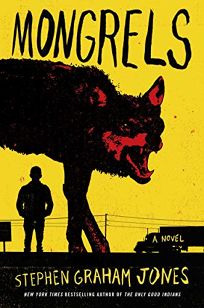In my cynical old age, I’ve become leery of books about supernatural critters like vampires and werewolves. I don’t want to blame Stephenie Meyer, but she did kick off this whole, like, vampires-and-werewolves renascence1 that seemed like a good thing at the time but then reached a point where there was too much of it.
Problem is, this too-much-of-a-good-thing thing didn’t erase my fondness for new interesting takes on supernatural critters; it just made me skeptical that there was anything new under the sun. So when Tor.com promised me that Mongrels was a take on werewolves I hadn’t seen before, I was intrigued. Add to that my desire to like Blackfeet horror author Stephen Graham Jones, whose short stories have been JUST TOO HORRIFYING for me, and it was a marriage made in book heaven.

If your question is “how much cannibalism though?” the answer is “honestly? still less than in at least half the Stephen Graham Jones short stories I’ve read.” So, I mean, you know if that’s a thing you can handle or not.
Our hero is an orphan boy being raised by his aunt Libby and uncle Darren. They are both werewolves, and the boy just wants to be — if he hasn’t turned by his late teens, he never will. As the family wanders across the American South getting whatever jobs will keep the lights on and sending the boy to school for brief stints when it’s possible, he learns more and more about the life of a werewolf and — most often — all the ways a werewolf can be caught and/or killed.
If like me you are the kind of reader who enjoys some social commentary in your werewolf literature, Mongrels is the book for you. Though the rootlessness and ruthlessness of the ways Darren and Libby and their nephew survive arise from their werewolf heritage, there’s a lot in this story that just reads poverty. Food insecurity follows them across the South, although they are werewolves and can, given the right circumstances, hunt their own. The boy is given different identities in every state (and indeed, he lacks a name, leaving his true identity shrouded in uncertainty), in and out of school depending on what the laws of the state will permit.
Mongrels is in some respects a picaresque, which is not my favorite type of book and kept this from being a forever-favorite. But it’s a take on werewolves that feels fresh and does not shy away from the utter creepiness of the transformation process. Despite the episodic nature of the storytelling, there’s plenty of emotional through-lines for you to sink your teeth into, plus an ending that yr extremely picky correspondent found satisfying.
QUESTION TIME: Would you rather starve than resort to cannibalism? Does your answer change if you are a wolf at the time? Also, are you tired of werewolves and other supernatural critters or do you rejoice in those stories endlessly?
- Sometimes I enjoy the British way of spelling “renaissance.” I hope you still love me even when I’m pretentious. ↩